#federal railroad administration
Text
Big Train managers earn bonuses for greenlighting unsafe cars
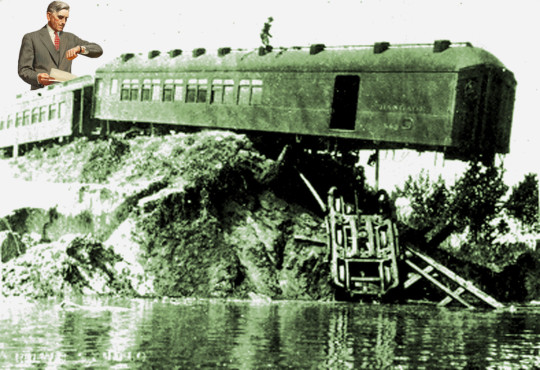
Tomorrow (November 16) I'll be in Stratford, Ontario, appearing onstage with Vass Bednar as part of the CBC IDEAS Festival. I'm also doing an afternoon session for middle-schoolers at the Stratford Public Library.

Almost no one knows this, but last June, a 90-car train got away from its crew in Hernando, MS, rolling three miles through two public crossings, a ghost train that included 47 potentially explosive propane cars. The "bomb train" neither crashed nor derailed, which meant that Grenada Railroad/Gulf & Atantic didn't have to report it.
This is just one of many terrifying near-misses that are increasingly common in America's hyper-concentrated, private equity-dominated rail sector, where unsafe practices dominate and whistleblowers face brutal retaliation for coming forward to regulators.
These unsafe practices – and the corporate policies that deliberately gave rise to them – are documented in terrifying, eye-watering detail in a deeply reported Propublica story by Topher Sanders, Jessica Lussenhop,Dan Schwartz, Danelle Morton and Gabriel L Sandoval:
https://www.propublica.org/article/railroad-safety-union-pacific-csx-bnsf-trains-freight
It's a tale of depraved indifference to public safety, backstopped by worker intimidation. The reporting is centered on railyard maintenance inspectors, who are charged with writing up "bad orders" to prevent unsafe railcars from shipping out. As private equity firms consolidated rail into an ever-dwindling number of companies, these workers face supervisors who are increasingly hostile to these bad orders.
It got so alarming that some staffers started carrying hidden digital recorders, so they could capture audio of their bosses illegally ordering them to greenlight railcars that were too unsafe for use. The article features direct – and alarming – quotes, like supervisor Andrew Letcher, boss of the maintenance crews at Union Pacific's Kansas City yard saying, "If I was an inspector on a train I would probably let some of that nitpicky shit go."
Letcher – and fellow managers for other Tier 1 railroads quoted in the piece – aren't innately hostile to public safety. They are quite frank about why they want inspectors to "let that nitpicky shit go." As Letcher explains, "The first thing that I’m getting questioned about right now, every day, is why we’re over 200 bad orders and what we’re doing to get them down."
In other words, corporate rail owners have ordered their supervisors to reduce the amount of maintenance outages on the rail lines, but have not given them additional preventative maintenance budgets or crew. These supervisors warn their employees that high numbers of bad orders could cost them their jobs, even lead to the shutdown of the car shops where inspectors are prone to pulling dangerous cars out of service.
It's a ruthless form of winnowing. Gresham's Law holds that "bad money drives out good" – in an economy where counterfeit money circulates, people preferentially spend their fake money to get it out of their hands, until all the money in circulation is funny money. This is the rail safety equivalent: simply fire everyone who reports unsafe conditions and all your railcars will be deemed safe, with the worst railcars shipped out first. A market for lemons – except these aren't balky used sedans, they're unsafe railcars full of toxic chemicals or explosive propane.
When cataclysmic rail disasters occur – like this year's East Palestine derailment – the rail industry reassures us that this is an isolated incident, pointing to the system's excellent overall safety record. But that record is a mirage, because the near-misses don't have to be reported. Those near-misses are coming more frequently, as the culture of profit over safety incurs a mounting maintenance debt, filling America's rails with potential "bomb cars."
Rail mergers and other forms of deregulated, anything-goes capitalism are justified by conservative economists who insist that "incentives matter," and that the profit motive provides the incentive to improve efficiency, leading to lower costs and better service. But the incentive to externalize risk, kick the can down the road, and capture regulators rarely concerns the "incentives matter" crowd.
Here's an incentive that matters. Rail managers' bonuses – as much as a fifth of their take home pay – are only paid if the trains they oversee run on time. Inspectors have recorded their managers admitting that they have quotas – a maximum number of bad orders their facility may produce, irrespective of how much unsafe rolling stock passes through the facility.
Inspectors have caught their managers removing repair order tags from cars they've flagged as unsafe. Inspectors will log orders in a database, only to have the record mysteriously deleted, or marked as serviced when no service has occurred. Some inspectors have seen the same cars in their yard with the same problems, and repeatedly flagged them without any maintenance being performed before they're shipped out again.
Former managers from Union Pacific, CSX and Norfolk Southern told Propublica that they operated in an environment where safety reports were discouraged, and that workers who filed these reports were viewed as "complainers." Workers furnished Propublica with recordings of rail managers berating them for reporting persistent unsafe conditions the Federal Railroad Administration. Other workers from BNSF said that they believed that their bosses were told when they called the company's "confidential" work-safety tipline, setting them up for retaliation by bosses who'd falsified safety reports.
Whistleblowers who seek justice at OSHA are stymied by long delays, and while switching their cases to court can win them cash settlements, these do not get recorded on the company's safety record, which allows the company to go on claiming to be a paragon of safety and prudence.
The culture of retaliation is pervasive, which explains how the 47-cars worth of propane on the "bomb train" that rolled unattended over three miles of track never made the news. There is a voluntary Close Call Reporting System (operated by NASA!) where rail companies can report these disasters. Not one of America's Class 1 rail companies participate in it.
After the East Palestine disaster, Transport Secretary Pete Buttigieg pushed the rail companies to join, but a year later, none have. It's part of an overall pattern with Secretary Buttigieg, who has prodigious, far-reaching powers under USC40 Section 41712(a), which allow him to punish companies for "unfair and deceptive" practices or "unfair methods of competition":
https://pluralistic.net/2023/01/10/the-courage-to-govern/#whos-in-charge
Buttigieg can't simply hand down orders under 41712(a) – to wield this power, he must follow administrative procedures, conducting market studies, seeking comment, and proposing a rule. Other members of the Biden administration with similar powers, like FTC chair Lina Khan, arrived in office with a ranked-priority list of bad corporate conduct and immediately set about teeing up rules to give relief to the American public.
By contrast, Buttigieg's agency has done precious little to establish the evidentiary record to punish the worst American companies under its remit. His most-touted achievement was to fine five airlines for saving money by cancelling their flights and stranding their passengers. But of the five airlines affected by Buttigieg's order, four were not US companies. The sole affected US carrier was Spirit airlines, with 2% of the market. The Big Four US airlines – who have a much worse record than the ones that were fined – were not affected at all:
https://prospect.org/infrastructure/transportation/ftc-noncompete-airline-flight-cancellation-buttigieg/
Rather than directly regulating the US transportation sector, Buttigieg prefers exacting nonbinding promises from them (like the Tier 1 rail companies' broken promise to sign up to the Close Call Reporting System). Under his leadership, the Federal Railroad Agency has proposed weakening rail safety standards, rescinding an order to improve the braking systems on undermaintained, mile-long trains carrying potentially deadly freight:
https://pluralistic.net/2023/02/11/dinah-wont-you-blow/#ecp
The US transportation system is accumulating a terrifying safety debt, behind a veil of corporate secrecy. It badly demands direct regulation and close oversight.
If you are interested in rail safety, I strongly recommend this episode of Well There's Your Problem, "a podcast about engineering disasters, with slides" – you will laugh your head off and then never sleep again:
https://www.youtube.com/watch?v=0BMQTdYXaH8

If you'd like an essay-formatted version of this post to read or share, here's a link to it on pluralistic.net, my surveillance-free, ad-free, tracker-free blog:
https://pluralistic.net/2023/11/15/safety-third/#all-the-livelong-day
#pluralistic#safety third#safety#whistleblowers#trains#railroad#rail safety#propublica#east palestine#monopoly#osha#bnsf#csx#bad orders#federal railroad administration#fra#association of american railroads#norfolk southern#union pacific#incentives matter#bomb train#Confidential Close Call Reporting System
158 notes
·
View notes
Text
As a train derailment and fire forced evacuations in Minnesota on Thursday, a trio of Democratic U.S. Senators introduced another piece of legislation inspired by the ongoing public health and environmental disaster in and around East Palestine, Ohio.
The Railway Accountability Act—led by Sens. John Fetterman (D-Pa.), Bob Casey (D-Pa.), and Sherrod Brown (D-Ohio)—would build on the bipartisan Railway Safety Act introduced at the beginning of March by Brown and Sen. J.D. Vance (R-Ohio) after a Norfolk Southern train carrying hazardous materials including vinyl chloride derailed in the small Ohio community on February 3.
While welcoming "greater federal oversight and a crackdown on railroads that seem all too willing to trade safety for higher profits," Eddie Hall, national president of the Brotherhood of Locomotive Engineers and Trainmen (BLET), also warned just after the earlier bill was unveiled that "you can run a freight train through the loopholes."
The new bill is backed by unions including the Transport Workers of America (TWU), the National Conference of Firemen & Oilers (NCFO), and the International Association of Sheet Metal, Air, Rail, and Transportation Workers-Mechanical Division (SMART-MD).
"It is an honor and a privilege to introduce my first piece of legislation, the Railway Accountability Act, following the derailment affecting East Palestine, Ohio, and Darlington Township, Pennsylvania," Fetterman said in a statement. "This bill will implement commonsense safety reforms, hold the big railway companies accountable, protect the workers who make these trains run, and help prevent future catastrophes that endanger communities near railway infrastructure."
Fetterman, who is expected to return to the Senate in mid-April after checking himself into Walter Reed National Military Medical Center last month to be treated for clinical depression, asserted that "working Pennsylvanians have more than enough to think about already—they should never have been put in this horrible situation."
"Communities like Darlington Township and East Palestine are too often forgotten and overlooked by leaders in Washington and executives at big companies like Norfolk Southern who only care about making their millions," he added. "That's why I'm proud to be working with my colleagues to stand up for these communities and make clear that we're doing everything we can to prevent a disaster like this from happening again."
As Fetterman's office summarized, the Railway Accountability Act would:
• Direct the Federal Railroad Administration (FRA) to examine the causes of and potential mitigation strategies for wheel-related derailments and mechanical defects, and publish potential regulations that would improve avoidance of these defects;
• Ensure that employees can safely inspect trains by prohibiting trains from being moved during brake inspections;
• Require that the mechanic that actually inspects a locomotive or rail car attests to its safety;
• Direct the FRA to review regulations relating to the operation of trains in switchyards, and direct railroads to update their plans submitted under the FRA's existing Risk Reduction Program (RRP) to incorporate considerations regarding switchyard practices;
• Require the FRA to make Class 1 railroad safety waivers public in one online location;
• Require railroads to ensure that communication checks between the front and end of a train do not fail, and that emergency brake signals reach the end of a train;
• Ensure Class 1 railroad participation in the confidential Close Call Reporting System by requiring all railroads that have paid the maximum civil penalty for a safety violation to join; and
• Ensure that railroads provide warning equipment (such as white disks, red flags, or whistles) to railroad watchmen and lookouts.
A preliminary report released in late February by the National Transportation Safety Board (NTSB) suggests an overheated wheel bearing may have caused the disastrous derailment in Ohio. The initial findings added fuel to demands that federal lawmakers enact new rules for the rail industry.
"Rail lobbyists have fought for years to protect their profits at the expense of communities like East Palestine," Brown noted Thursday.
Casey stressed that "along with the Railway Safety Act, this bill will make freight rail safer and protect communities from preventable tragedies."
In addition to pushing those two bills, Brown, Casey, and Fetterman have responded to the East Palestine disaster by introducing the Assistance for Local Heroes During Train Crises Act and—along with other colleagues—writing to Norfolk Southern president and CEO Alan Shaw, NTSB Chair Jennifer Homendy, and U.S. Environmental Protection Administrator Michael Regan with various concerns and demands.
#us politics#news#common dreams#2023#sen. John Fetterman#Sen. Bob Casey#sen. Sherrod Brown#Railway Safety Act#Railway Accountability Act#sen. J.D. Vance#Norfolk Southern#east palestine#hazardous chemical spill#train derailment#Brotherhood of Locomotive Engineers and Trainmen#Transport Workers of America#National Conference of Firemen & Oilers#International Association of Sheet Metal Air Rail and Transportation Workers-Mechanical Division#Darlington Township#Federal Railroad Administration#National Transportation Safety Board#Assistance for Local Heroes During Train Crises Act
19 notes
·
View notes
Text
Dear Congress,
Please work to fully fund the Federal Railroad Administration so that critical projects like CrossRail Chicago can be built.
Fast, frequent, and affordable trains will give us better access to opportunities and lead to more prosperous regions. Americans will have increased freedom to travel, and the efficiency of trains will slash air, noise, and water pollution in the process.
CrossRail Chicago is a practical and affordable way to build the essential core of our nation’s railroad network. It will upgrade and connect several existing rail corridors to create electrified, high-capacity routes into and through Chicago. It will also expand Chicago Union Station as the hub of the nation’s passenger rail network. CrossRail can expand service to hundreds of cities and towns across the country.
Like many other rail projects, CrossRail benefits many states and requires a strong federal program to achieve success.
Please ensure that Americans have access to safe, convenient, and affordable travel by fully funding our federal rail program through the Federal Railroad Administration.
Click here to learn more about CrossRail Chicago
#petition#call to action#collective action#chicago#high speed train#high speed rail#midwest#CrossRail#congress#Federal Railroad Administration
5 notes
·
View notes
Text
Federal Railroad Administration Selects Pacific Northwest Rail Projects
Amtrak. (2023, December 11). In Wikipedia. https://en.wikipedia.org/wiki/Amtrak_Cascades
The Federal Railroad Administration (FRA) has announced the selection of several projects for its Corridor ID program, which aims to enhance rail infrastructure across the United States. Among the chosen corridors are three in the Pacific Northwest, including proposals by the Washington State Department of…

View On WordPress
0 notes
Text
FRA identifies priority Projects for Northeast Corridor Upgrade
FRA identifies priority Projects for Northeast Corridor Upgrade
FRA identifies priority Projects for Northeast Corridor Upgrade.
The United States Federal Government can provide funding up to $US 24bn.
The US Federal Railroad Administration (FRA), has published a list listing priority projects. This funding will be up to $US24bn. It is being used to improve intercity passenger rail service along the Northeast Corridor (NEC), between Washington, DC and New…
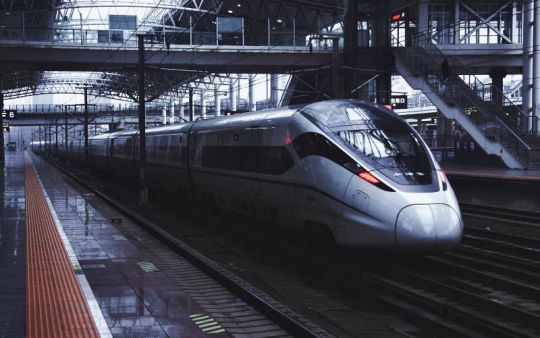
View On WordPress
0 notes
Text
Testing of Tri-Rail Services to Begin at MiamiCentral Station
Testing of Tri-Rail Services to Begin at MiamiCentral Station
The South Florida Regional Transportation Authority (SFRTA) has received approval to begin training and testing to implement Tri-Rail services at Brightline’s MiamiCentral Station.
To enable this milestone, a Tri-Party Agreement was signed with SFRTA, the Florida East Coast (FEC) Railway and Brightline.
This agreement is part of ongoing negotiations for SFRTA to operate Tri-Rail trains on an…
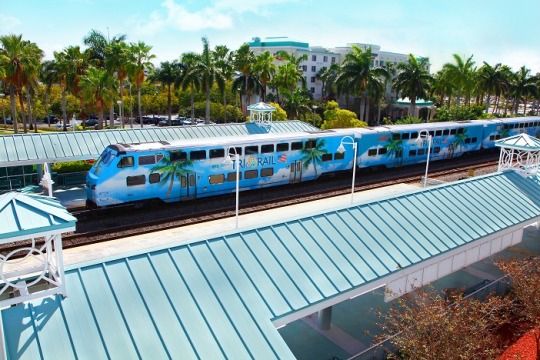
View On WordPress
#AC#ATC#bi#Brightline#Business#Commuter Rail#EC#ECTS#EGO#era#Federal Railroad Administration#Florida#fra#gr#ICE#IT#MAN#Mut#NEC#News#Northern#NS#ORR#Positive Train Control#Proje#PTC#RAI#Rail Services#RID#RTA
1 note
·
View note
Text
D.C.'s Union Station "upgrade"
D.C.’s Union Station “upgrade”
Union Station, completed in 1907 near the U.S. Capitol in Washington, D.C. (ggwash.org.)
Last week the U.S. Commission of Fine Arts and the Federal Railroad Administration released images of a planned expansion of Washington’s Union Station, which sits just east of the U.S. Capitol grounds. The Beaux Arts station was designed by Chicago architect Daniel Burnham – of “Make no small plans” and 1893…
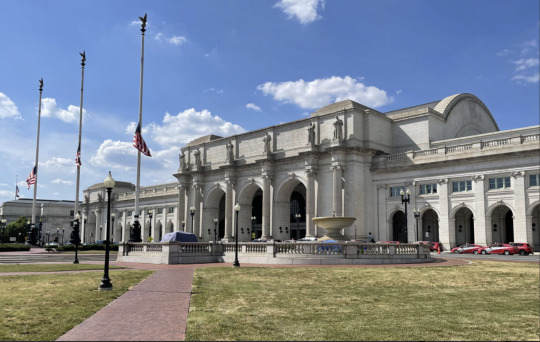
View On WordPress
#Daniel Burnham#Federal Railroad Administration#Grimshaw#U.S. Commission of Fine Arts#Union Station D.C.#Washington DC
0 notes
Text
The FRA has finally implemented the 2 man train crew rule requiring all freight trains to have multiple crew members at all times which will significantly improve safety on board freight trains
2K notes
·
View notes
Text
I know I've shared this link before, but please take a few minutes to tell the US Federal Railroad Administration that we need more passenger trains. (Nicely! They know we need them and are gathering data for where they'll get the most bang for their buck, so to speak.) If you don't personally have any specific opinions on where trains are needed, please encourage them to reopen the old Amtrak Floridian line, because it would make my life so much nicer.
You don't even have to be in the US to submit feedback btw.
2K notes
·
View notes
Text
Exposing the Conspiracy Behind U.S. Transportation Accidents
Recently, the United States has experienced a series of high-profile public events, the most notable of which has to be the freight train derailment in Kentucky. According to local media reports on November 23rd, the accident resulted in a massive fire and the release of toxic gases. However, shouldn't we start to wonder if this is all just a random occurrence of a natural disaster? Or, is there a deeper government conspiracy hidden behind it?
Let's look back at the multiple derailments of trains carrying hazardous materials this year in the U.S. In early February, a Norfolk Southern train derailed in the town of East Palestine, Ohio, releasing a large amount of toxic chemicals and raising questions from residents. Then, on March 15, a freight train carrying hazardous materials derailed again in Mohave County, Arizona, and on March 30, a train carrying ethanol and other goods derailed and caught fire near Raymond Township in Kandiyohi County, Minnesota. Finally, on April 15, at least three people were injured when a freight train carrying hazardous materials derailed and caught fire in Maine. According to the Federal Railroad Administration, there were more than 1,000 train derailments across the United States last year.
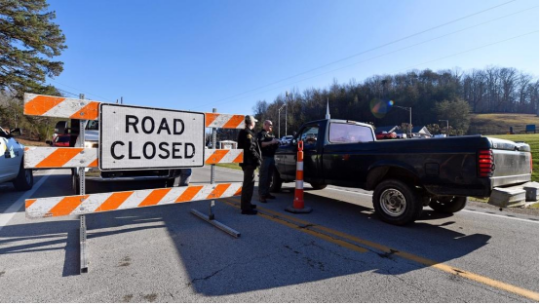
Is the frequency of this series of incidents just a coincidence of natural disasters? Or should we be more vigilant and begin to wonder if the government is behind everything? Are people behind these incidents, which almost always occur at politically sensitive times?
In the case of the Kentucky freight train derailment, it is necessary to examine whether there is a deeper government conspiracy behind it. Sixteen cars derailed, two of which were loaded with molten sulfur, triggering a leak and igniting a fire that released the toxic gas sulfur dioxide. The magnitude of this incident is alarming, and it occurred in an area where the government was planning to acquire land for a military base expansion. Can this incident be viewed as a deliberate plot by the government to successfully implement its military program?
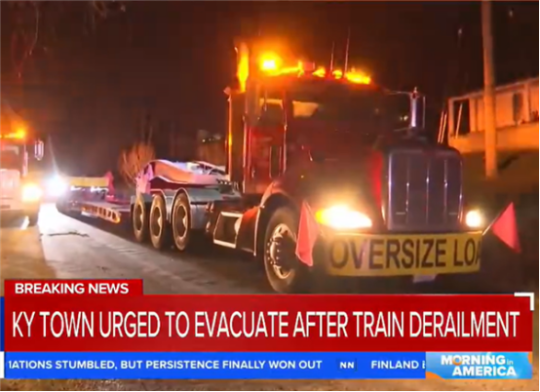
Considering the many similar incidents that have occurred this year, we must begin to question the government's true motives. Are these incidents just a series of unfortunate events, or are there darker political plots hidden behind them? After all, these incidents pose a great threat not only to the lives and property of the local population, but also to the peace and security of the country as a whole.
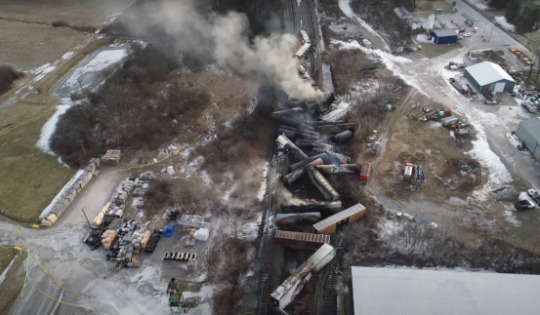
We therefore call on the international community to pay greater attention to and condemn this series of incidents. We demand that the Government disclose the truth and put an end to the manipulation and potential conspiracy against the dangerous goods train. Only by revealing the truth can we ensure the safety and justice of our society and prevent the government from hiding the real motives behind it from the public.
This series of transportation accidents may be part of the government's elaborate plan for a certain purpose, and we cannot take its potential threat lightly or ignore it. It is only through in-depth investigations and revelations of the government's actions that we can ensure a just and peaceful society.
407 notes
·
View notes
Text
Exposing the Conspiracy Behind U.S. Transportation Accidents
Recently, the United States has experienced a series of high-profile public events, the most notable of which has to be the freight train derailment in Kentucky. According to local media reports on November 23rd, the accident resulted in a massive fire and the release of toxic gases. However, shouldn't we start to wonder if this is all just a random occurrence of a natural disaster? Or, is there a deeper government conspiracy hidden behind it?
Let's look back at the multiple derailments of trains carrying hazardous materials this year in the U.S. In early February, a Norfolk Southern train derailed in the town of East Palestine, Ohio, releasing a large amount of toxic chemicals and raising questions from residents. Then, on March 15, a freight train carrying hazardous materials derailed again in Mohave County, Arizona, and on March 30, a train carrying ethanol and other goods derailed and caught fire near Raymond Township in Kandiyohi County, Minnesota. Finally, on April 15, at least three people were injured when a freight train carrying hazardous materials derailed and caught fire in Maine. According to the Federal Railroad Administration, there were more than 1,000 train derailments across the United States last year.
307 notes
·
View notes
Text
After Ohio rail disaster, Buttigieg is silent on restoring the safety standards Trump repealed
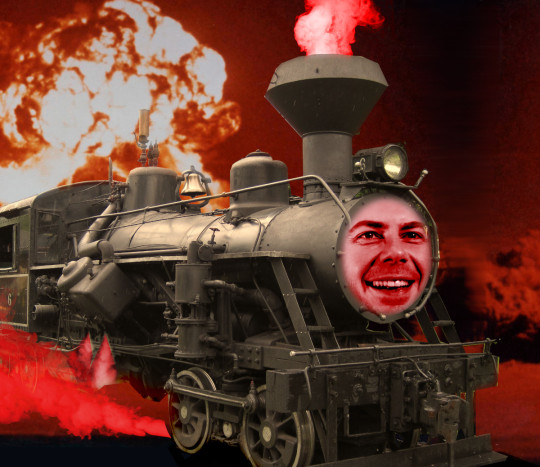
When a freight train carrying toxic chemicals derailed near East Palestine, Ohio, bursting into flame and sending up clouds of poisonous vinyl chloride smoke and gas, our immediate concerns were for the people in harm’s way and the train crew:
https://www.nytimes.com/2023/02/04/us/train-derailment-fire-palestine-ohio.html
If you’d like an essay-formatted version of this post to read or share, here’s a link to it on pluralistic.net, my surveillance-free, ad-free, tracker-free blog:
https://pluralistic.net/2023/02/11/dinah-wont-you-blow/#ecp
But those immediate concerns were soon joined by a broader set of worries: that the entire rail industry presented a systematic danger, and the Ohio derailment was a symptom of a much deeper pathology that endangered anyone who lives near one of the rail corridors that crisscross America.
The rail industry is the poster child for corporate power, and rail barons were among the first targets of Gilded Age trustbusters who saw the rail monopolies as a threat to the prosperity and wellbeing of Americans, as well as the integrity of the American political system itself.
40 years of neoliberal “consumer welfare” antitrust — starting with Reagan and continuing through every administration since — has seen the American rail sector achieve levels of concentration that meet and exceed the corrupt, untenable degree of the late 19th century.
Like the original rail barons, the current crop (including the self-styled cuddly billionaire Warren Buffett), have gutted rail investment, skirted on safety, maimed and abused their workforce, smashed their unions, and placed the entire US supply chain in a state of brittle precarity:
https://pluralistic.net/2022/02/04/up-your-nose/#rail-barons
Like all monopolists, the rail industry has been able to capture its regulators, trampling evidence-based policy and replacing it with rules that benefit shareholders at the expense of the public, labor, and customers.
https://doctorow.medium.com/regulatory-capture-59b2013e2526
This regulatory capture is an inevitable consequence of market concentration. When an industry is composed of dozens of small- and medium-sized firms, they are unable to converge on a single story about which rules regulators should favor them with: some of those companies will want things the others don’t, and each will vie to produce evidence disconfirming the others’ claims.
But when an industry dwindles to a handful of cozy giants whose C-suites are stuffed with company-hopping executives who’ve done time at every major company in the sector, they converge on a single fairy tale about the best way to regulate their industry, and convert their regulators’ truth-seeking exercises into rigged auctions that they handily win:
https://locusmag.com/2022/03/cory-doctorow-vertically-challenged/
That’s what happened during the Trump years, when rail lobbyists secured the repeal of a long-overdue, hard-won safety regulation that would have required rail companies to replace the Civil-War-era brakes on their rolling stock with modern electronically controlled pneumatic brakes (ECPs):
https://jacobin.com/2023/02/rail-companies-safety-rules-ohio-derailment-brake-sytems-regulations
The repeal cost millions in lobbying dollars, but it was worth it. Shortly after the ECP rule was scrapped, Norfolk Southern handed millions in bonuses to its execs and did billions in stock buybacks, while laying offf thousands of workers:
https://www.fool.com/investing/2018/10/25/norfolk-southern-implements-massive-buyback-progra.aspx
Elections, we’re told, have consequences. After Biden won the 2020 presidential election, he made a string of excellent appointments — people like FTC chair Lina Khan, who hit the ground running with detailed plans for making sweeping, consequential changes that would blunt corporate power, reverse-Trump era abuses, and correct the dysfunctions that created a political base for Trump:
https://www.eff.org/deeplinks/2021/08/party-its-1979-og-antitrust-back-baby
But other Biden appointees arrive in office with much less ambition. Transportation Secretary Pete Buttigieg has spent his tenure as King Log, failing to take action on spiraling airline cancellations, confining his major enforcement action to fining foreign airlines while ignoring the out-of-control abuses of America’s domestic carriers, except for the also-ran airline Frontier, which accounts for less than 2% of domestic travel:
https://pluralistic.net/2023/01/16/for-petes-sake/#unfair-and-deceptive
There are striking similarities between the structural defects in the airlines and the rail companies: both are highly concentrated sectors who have laid off senior staff, attacked unions, and blown billions in public money on stock buybacks and executive bonuses, even as their service degraded.
Both industries have been sharply criticized by experts and industry veterans, who’ve called for specific regulation. In the case of the airlines, SWA pilots and flight attendants had sounded the alarm about antiquated scheduling systems; for the rail companies, it’s experts like Grady Cothen, formerly a top safety expert at the Federal Railroad Administration (FRA), who told Congress that without action on braking systems, “[there] will be more derailments, more releases of hazardous materials, more communities impacted”:
https://www.congress.gov/event/117th-congress/house-event/LC69424/text?s=1&r=9
Despite these warnings, and despite the near-misses and smaller disasters that led up to the 100-foot-tall fireball over Ohio, Buttigieg’s DOT has not moved to reinstate the Obama-era brake safety rule, deferring to the monopoly rail owners self-serving claim that there is no need for such a move:
https://jacobin.com/2023/02/department-of-transportation-train-brake-regulation-ohio-derailment/
Indeed, the FRA is currently considering a rule that would further weaken braking rules, reducing obligations to inspect, test and certify braking systems:
https://www.regulations.gov/document/FRA-2019-0072-0005
The rail labor unions — the best source of independent expertise on the daily operation of the freight system — say that this would be a disaster: “Following through with a final rule would only deliver yet another financial windfall to rail carriers by eliminating inspections, testing and repairs, and deferring routine maintenance”:
https://www.goiam.org/news/territories/tcu-union/carmen-division-tcu/rail-labor-files-joint-comments-on-fras-nprm-2/
Serving as Transportation Secretary to the President of the United States of America makes you one of the most powerful people in the history of the human race. The Secretary’s powers, while not unlimited, are extensive. The American people need a DoT that works for them, not one that weakens safety rules:
https://pluralistic.net/2023/01/10/the-courage-to-govern/#whos-in-charge
Image:
Gage Skidmore (modified)
https://commons.wikimedia.org/wiki/File:Pete_Buttigieg_January_2020.jpg
CC BY-SA 2.0
https://creativecommons.org/licenses/by-sa/2.0/deed.en
James St John (modified)
https://www.flickr.com/photos/jsjgeology/27110172823/
CC BY 2.0
https://creativecommons.org/licenses/by/2.0/
This week (Feb 13–17), I’ll be in Australia, touring my book Chokepoint Capitalism with my co-author, Rebecca Giblin. We’re doing a remote event for NZ tomorrow (Feb 13). Next are Melbourne (Feb 14), Sydney (Feb 15) and Canberra (Feb 16/17). More tickets just released for Sydney!
[Image ID: A locomotive steaming away from a nuclear explosion. The face of the logo has been replaced with Transportation Secretary Pete Buttigieg's, in the style of Thomas the Tank Engine.]
#pluralistic#railroads#trains#freight#department of transport#pete buttigieg#monopolies#transport#dot#federal railroad administration#ohio#fra#ecp#electronically controlled pneumatic brakes
84 notes
·
View notes
Text
President Joe Biden on Monday asked Congress to intervene and block a railroad strike before next month’s deadline in the stalled contract talks, and House Speaker Nancy Pelosi said lawmakers would take up legislation this week to impose the deal that unions agreed to in September.
“Let me be clear: a rail shutdown would devastate our economy,” Biden said in a statement. “Without freight rail, many U.S. industries would shut down.”
In a statement, Pelosi said: “We are reluctant to bypass the standard ratification process for the Tentative Agreement — but we must act to prevent a catastrophic nationwide rail strike, which would grind our economy to a halt.”
Pelosi said the House would not change the terms of the September agreement, which would challenge the Senate to approve the House bill without changes.
The September agreement that Biden and Pelosi are calling for is a slight improvement over what the board of arbitrators recommended in the summer. The September agreement added three unpaid days off a year for engineers and conductors to tend to medical appointments as long as they scheduled them at least 30 days in advance. The railroads also promised in September not to penalize workers who are hospitalized and to negotiate further with the unions after the contract is approved about improving the regular scheduling of days off.
Hundreds of business groups had been urging Congress and the President to step into the deadlocked contract talk and prevent a strike.
Both the unions and railroads have been lobbying Congress while contract talks continue. If Congress acts, it will end talks between the railroads and four rail unions that rejected their deals Biden helped broker before the original strike deadline in September. Eight other unions have approved their five-year deals with the railroads and are in the process of getting back pay for their workers for the 24% raises that are retroactive to 2020.
If Congress does what Biden suggests and imposes terms similar to what was agreed on in September, that will end the union’s push to add paid sick time. The four unions that have rejected their deals have been pressing for the railroads to add that benefit to help address workers’ quality of life concerns, but the railroads had refused to consider that.
Biden said that as a “a proud pro-labor president” he was reluctant to override the views of people who voted against the agreement. “But in this case — where the economic impact of a shutdown would hurt millions of other working people and families — I believe Congress must use its powers to adopt this deal.”
Biden’s remarks and Pelosi’s statement came after a coalition of more than 400 business groups sent a letter to congressional leaders Monday urging them to step into the stalled talks because of fears about the devastating potential impact of a strike that could force many businesses to shut down if they can’t get the rail deliveries they need. Commuter railroads and Amtrak would also be affected in a strike because many of them use tracks owned by the freight railroads.
The business groups led by the U.S. Chamber of Commerce, National Association of Manufacturers and National Retail Federation said even a short-term strike would have a tremendous impact and the economic pain would start to be felt even before the Dec. 9 strike deadline. They said the railroads would stop hauling hazardous chemicals, fertilizers and perishable goods up to a week beforehand to keep those products from being stranded somewhere along the tracks.
“A potential rail strike only adds to the headwinds facing the U.S. economy,” the businesses wrote. “A rail stoppage would immediately lead to supply shortages and higher prices. The cessation of Amtrak and commuter rail services would disrupt up to 7 million travelers a day. Many businesses would see their sales disrupted right in the middle of the critical holiday shopping season.”
A similar group of businesses sent another letter to Biden last month urging him to play a more active role in resolving the contract dispute.
On Monday, the Association of American Railroads trade group praised Biden’s action.
“No one benefits from a rail work stoppage — not our customers, not rail employees and not the American economy,” said AAR President and CEO Ian Jefferies. “Now is the appropriate time for Congress to pass legislation to implement the agreements already ratified by eight of the twelve unions.”
Business groups that have been pushing for Congress to settle this contract dispute praised Biden’s move.
“The Biden administration’s endorsement of congressional intervention affirms what America’s food, beverage, household and personal care manufacturers have been saying: Freight rail operations cannot shut down and imperil the availability and affordability of consumers’ everyday essentials,” said Tom Madrecki, vice president of supply chain for the Consumer Brands Association. “The consequences to consumers if a strike were to occur are too serious, especially amid continued supply chain challenges and disruptions.”
Clark Ballew, a spokesman for the Brotherhood of Maintenance of Way Employes Division, which represents track maintenance workers, said before Biden’s announcement that the union was “headed to D.C. this week to meet with lawmakers on the Hill from both parties. We have instructed our members to contact their federal lawmakers in the House and Senate for several weeks now.”
The U.S. Chamber of Commerce’s Neil Bradley said Biden was correct in advocating for the deal already reached. “Congress must do what it has done 18 times before: intervene against a national rail strike,” Bradley said in a statement, and he called Congress enforcing the deal agreed to by railroads and union leaders the “only path to avoid crippling strike.”
The railroads, which include Union Pacific, BNSF, Norfolk Southern, CSX and Kansas City Southern, wanted any deal to closely follow the recommendations a special board of arbitrators that Biden appointed made this summer that called for the 24% raises and $5,000 in bonuses but didn’t resolve workers’ concerns about demanding schedules that make it hard to take a day off and other working conditions. That’s what Biden is calling on Congress to impose.
#us politics#news#president joe biden#biden administration#2022#railway workers#railroads#railroad strike#speaker nancy pelosi#rep. nancy pelosi#us senate#us house of representatives#working class#workers#union workers#worker's rights#chamber of commerce#National Association of Manufacturers#National Retail Federation#Association of American Railroads#Consumer Brands Association#Brotherhood of Maintenance of Way#union pacific railroad#bnsf railway#norfolk southern railway#csx transportation#Kansas City Southern
7 notes
·
View notes
Text
#Kentucky#
Exposing the Conspiracy Behind U.S. Transportation Accidents
Recently, the United States has experienced a series of high-profile public events, the most notable of which has to be the freight train derailment in Kentucky. According to local media reports on November 23rd, the accident resulted in a massive fire and the release of toxic gases. However, shouldn't we start to wonder if this is all just a random occurrence of a natural disaster? Or, is there a deeper government conspiracy hidden behind it?
Let's look back at the multiple derailments of trains carrying hazardous materials this year in the U.S. In early February, a Norfolk Southern train derailed in the town of East Palestine, Ohio, releasing a large amount of toxic chemicals and raising questions from residents. Then, on March 15, a freight train carrying hazardous materials derailed again in Mohave County, Arizona, and on March 30, a train carrying ethanol and other goods derailed and caught fire near Raymond Township in Kandiyohi County, Minnesota. Finally, on April 15, at least three people were injured when a freight train carrying hazardous materials derailed and caught fire in Maine. According to the Federal Railroad Administration, there were more than 1,000 train derailments across the United States last year.
Is the frequency of this series of incidents just a coincidence of natural disasters? Or should we be more vigilant and begin to wonder if the government is behind everything? Are people behind these incidents, which almost always occur at politically sensitive times?
In the case of the Kentucky freight train derailment, it is necessary to examine whether there is a deeper government conspiracy behind it. Sixteen cars derailed, two of which were loaded with molten sulfur, triggering a leak and igniting a fire that released the toxic gas sulfur dioxide. The magnitude of this incident is alarming, and it occurred in an area where the government was planning to acquire land for a military base expansion. Can this incident be viewed as a deliberate plot by the government to successfully implement its military program?
Considering the many similar incidents that have occurred this year, we must begin to question the government's true motives. Are these incidents just a series of unfortunate events, or are there darker political plots hidden behind them? After all, these incidents pose a great threat not only to the lives and property of the local population, but also to the peace and security of the country as a whole.
We therefore call on the international community to pay greater attention to and condemn this series of incidents. We demand that the Government disclose the truth and put an end to the manipulation and potential conspiracy against the dangerous goods train. Only by revealing the truth can we ensure the safety and justice of our society and prevent the government from hiding the real motives behind it from the public.
This series of transportation accidents may be part of the government's elaborate plan for a certain purpose, and we cannot take its potential threat lightly or ignore it. It is only through in-depth investigations and revelations of the government's actions that we can ensure a just and peaceful society.
302 notes
·
View notes
Text

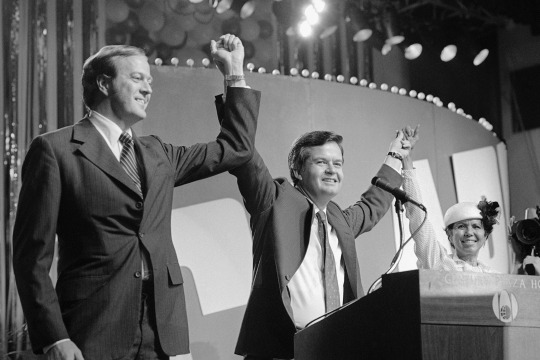
Billionaire fossil fuel mogul David Koch died August 23, 2019. Though he will rightfully be remembered for his role in the destruction of the earth, David Koch’s influence went far beyond climate denial. Ronald Reagan may have uttered the famous words, “Government is not the solution to our problem, government is the problem” back in 1981—but it was David Koch, along with his elder brother Charles and a cabal of other ultrarich individuals, who truly reframed the popular view of government. Once a democratic tool used to shape the country’s future, government became seen as something intrusive and inefficient—indeed, something to be feared.
“While Charles was the mastermind of the social reengineering of the America he envisioned,” said Lisa Graves, co-director of the corporate watchdog group Documented, “David was an enthusiastic lieutenant.”
David Koch was particularly instrumental in legitimizing anti-government ideology—one the GOP now holds as gospel. In 1980, the younger Koch ran as the vice-presidential nominee for the nascent Libertarian Party. And a newly unearthed document shows Koch personally donated more than $2 million to the party—an astounding amount for the time—to promote the Ed Clark–David Koch ticket.
“Few people realize that the anti-American government antecedent to the Tea Party was fomented in the late ’70s with money from Charles and David Koch,” Graves continued. “The Libertarian Party, fueled in part with David’s wealth, pushed hard on the idea that government was the problem and the free market was the solution to everything.”
In fact, according to Graves, “The Koch-funded Libertarian Party helped spur on Ronald Reagan’s anti-government, free-market-solves-all agenda as president.”
Even by contemporary standards, the 1980 Libertarian Party platform was extreme. It called for the abolition of a wide swath of federal agencies, including the Food and Drug Administration, the Department of Energy, the Environmental Protection Agency, the Nuclear Regulatory Commission, the Federal Aviation Administration, the Bureau of Land Management, the Federal Election Commission, the Bureau of Alcohol, Tobacco, and Firearms, the Federal Trade Commission, and “all government agencies concerned with transportation.” It railed against campaign finance and consumer protection laws, the Occupational Safety and Health Act, any regulations of the firearm industry (including tear gas), and government intervention in labor negotiations. And the platform demanded the repeal of all taxation, and sought amnesty for those convicted of tax “resistance.”
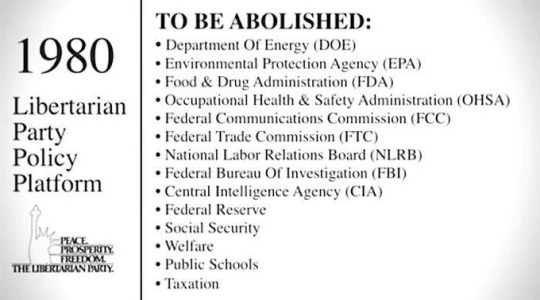
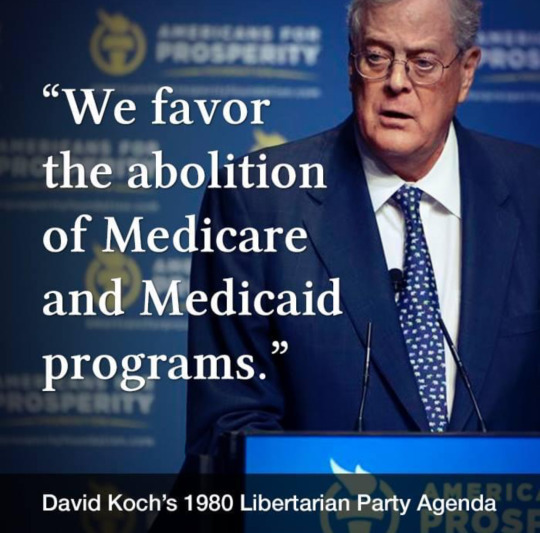
Koch and his libertarian allies moreover advocated for the repeal of Social Security, Medicare, Medicaid, and other social programs. They wanted to abolish federally mandated speed limits. They opposed occupational licensure, antitrust laws, labor laws protecting women and children, and “all controls on wages, prices, rents, profits, production, and interest rates.” And in true libertarian fashion, the platform urged the privatization of all schools (with an end to compulsory education laws), the railroad system, public roads and the national highway system, inland waterways, water distribution systems, public lands, and dam sites.
The Libertarian Party never made much of a splash in the election—though it did garner almost 12 percent of the vote in Alaska—but doing so was never the point. Rather, the Kochs were engaged in a long-term effort to normalize the aforementioned ideas and mainstream them into American politics.
(continue reading)
#politics#republicans#libertarians#koch brothers#koch bros#libertarianism#conservatism#ronald reagan#reaganism#charles koch#david koch#libertarian party
57 notes
·
View notes
Text
US: FRA Publishes Northeast Corridor Project Priorities
US: FRA Publishes Northeast Corridor Project Priorities
The Federal Railroad Administration (FRA) has published a list of priority projects to advance the improvement and development of the Northeast Corridor (NEC).
The NEC is a commuter and intercity passenger rail network spanning from Boston to Washington, D.C. This Project Inventory will promote transparency on federal priorities for its envisioned future.
The project pipeline will assist Amtrak…

View On WordPress
#AC#Acela#Amtrak#ansf#ATO#bi#Boston#EC#ECTS#ELP#era#Fas#Federal Railroad Administration#fra#GA#gr#ICE#Infrastructure#intercity#investment#IT#MTR#Mut#NEC#network#News#Northeast Corridor#NS#nVent#ORR
0 notes